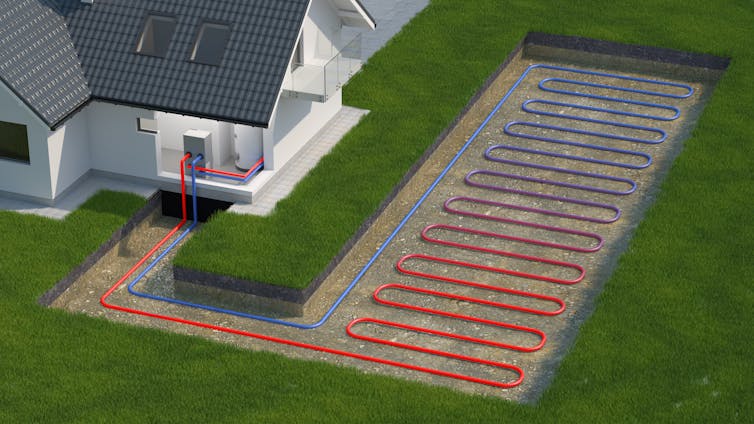While most UK homes are burning the increasingly expensive fossil fuel natural gas in boilers, a vast and zero-carbon source of heating lies untapped underground.
Greenhouse gas emissions from heating buildings make up 23% of the national total – second only to those from transport. Most of the accessible geothermal heat in the UK is between 100°C and 150°C, which is too cold for generating electricity efficiently. But it can be pumped directly into central heating systems and district heat networks to warm entire neighbourhoods.
And geothermal energy has an advantage over other green sources. Unlike wind and solar, which are weather-dependent, the heat retained inside the Earth from the planet’s formation is a very consistent source of energy. But at present, the UK is barely paying attention to it.
Geothermal energy is most commonly used in the UK to regulate the temperature of individual properties through heat pumps. These appliances extract buried warmth using a system of shallow water pipes running underground. Combined with deeper sources, geothermal heat supplies just over 4% of the country’s renewable energy.

Studio Harmony/Shutterstock
Cutting emissions from heating will require a variety of different technologies, but it’s estimated that the UK has enough accessible geothermal energy near populated areas to meet current heating demand across the UK for at least 100 years.
So what’s holding back this stable – and sustainable – source of home heating? The first and biggest hurdle is in the UK’s legal system, which lacks a clear definition of “heat” as a resource that can be owned and which needs protecting.
The result is that, at present, the UK has no bespoke regime for regulating the extraction of geothermal energy. Instead, extracting this heat is regulated through a number of other regimes which deal with other activities, such as the planning system which regulates the use of land.
The law regards heat not as something useful, but as a physical characteristic of a property. This is in contrast to oil and gas, which are treated as separate resources which can be licensed and sold no matter where they are found. This leaves no clear answer as to who owns the heat. Answering this question is essential to develop a regulatory system which can deliver affordable and sustainable energy.
License to drill
One way forward would be to define heat as a resource over which the owner of the land has proprietary rights. This might encourage widespread use of geothermal energy as a replacement for fossil fuels, as financial gain would motivate landowners to extract it. But without careful regulation, extraction could become unsustainable or interfere with the rights of other landowners where geothermal reservoirs cross property boundaries.
An alternative regulatory system would give ownership of all underground heat to the state. This already happens with oil and gas. In this system, Westminster would award permits and concessions to companies able to look for and exploit heat on a commercial scale.
A centrally run regime, in which only the government can license access to geothermal heat to skilled operators, could help manage potential environmental impacts. For instance, the government could set licence terms and conditions which require the operator to use particular techniques and equipment which reduce the risk of soil and water pollution.
Fines, or even imprisonment, could punish non-compliance. A government-run licensing system would also be better equipped to guarantee a stable supply of heat, as there would be no disputes over ownership between neighbouring landowners.
Legal support for a state-led approach already exists in the Infrastructure Act 2015. This allows any person the right to exploit geothermal heat from 300 metres or more below the land surface without having to compensate the landowner.
The state could guarantee a company that it will not grant further licences which might interfere with the amount of heat the company is entitled to extract, in turn making the company’s necessary (and substantial) investment safer. This investment can take a long time to deliver returns, which is particularly troubling for smaller, specialist companies who are unable to take significant risks.
While individual property owners can install heat pumps with relative ease (there is no planning permission necessary), a proper regulatory regime is needed to allow the UK to scale up the extraction of geothermal heat on an industrial scale. A secure, affordable and carbon-neutral heating source is possible, but to achieve it, geothermal heat must be considered a part of the energy system, and subject to a set of rules akin to the tried and tested regimes that govern the extraction and distribution of other fuels.
An important place to start would be sorting out who actually owns the heat.

Don’t have time to read about climate change as much as you’d like?
Get a weekly roundup in your inbox instead. Every Wednesday, The Conversation’s environment editor writes Imagine, a short email that goes a little deeper into just one climate issue. Join the 10,000+ readers who’ve subscribed so far.
![]()
Anna McClean receives funding from the Engineering and Physical Science Research Council (EPSRC).
Ole Pedersen receives funding from the Engineering and Physical Sciences Research Council (EPSRC).
Source: TheConversation


